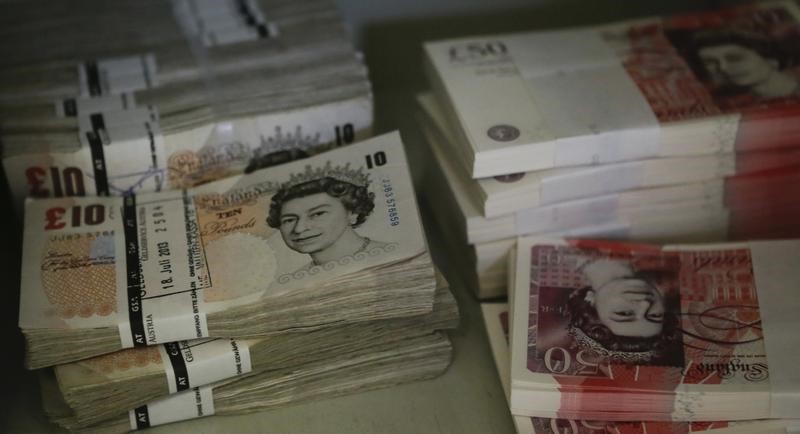Investing.com’s stocks of the week
By Jemima Kelly and Patrick Graham
LONDON (Reuters) - A recovery by sterling stalled in late trading in London on Tuesday, as worries over banks, growth and investment continued to dominate the market following Britain's vote last week to leave the European Union.
The pound rebounded by as much as 1.5 percent
But it paled into insignificance compared with the currency's decline to a 31-year low. Its 7 percent drop on Friday was its steepest one-day decline in the post-1973 era of floating exchange rates.
Sterling reached $1.3421 around midday on Tuesday, still more than 16 cents lower than before the referendum results, then fell back to $1.3327. A mass of banks and fund managers have predicted further declines for the pound since Friday.
"It does seem clear that sterling goes down in trade-weighted terms over the short to medium term," said Richard Benson, a portfolio manager at Millennium Global. "There is no doubt that the impact on the UK economy is negative. It is a tier one economic shock."
He and some other analysts and investors, however, said sterling was likely to get some support from shifting expectations on U.S. interest rates.
Markets are now pricing in a 7 percent chance the Federal Reserve will cut rates in July and an 18 percent chance of a cut in September. They discarded any chance of a rate increase this year, according to CME FedWatch.
"Janet Yellen could not bring herself to raise rates when the conditions were perfect for it. She is not going to do it now," Benson said.
Some analysts said markets were taking some reassurance from the fact that British politicians were not rushing to trigger the Article 50 mechanism for a state to leave the EU.
British finance minister George Osborne said on Tuesday that Article 50 - the relevant clause of the EU's Lisbon Treaty - should not be invoked until the shape of Britain's future relationship with the EU had become clear.
Political rhetoric would be likely to move the pound around over the coming weeks, said Derek Halpenny, the Bank of Tokyo-Mitsubishi UFJ's European head of global markets research.
"Like all markets, there's bound to be periods when we get some modest rebound or consolidation," Halpenny said.
"Why today? Perhaps it's a sense of some of this backtracking that's taking place from the 'Leave' side in terms of immigration in particular, which might be an indication that they're looking to get a still quite favorable deal in regard to access to the single market," he said.
Halpenny was referring to comments made by Conservative MEP Daniel Hannan on Friday, who said the "Leave" campaign never promised a radical decline in immigration, and by anti-EU UKIP leader Nigel Farage, who on Monday said he was "nervous" about some of the comments that had been made after the referendum.
The ratings agencies Standard & Poor's and Fitch both downgraded Britain's sovereign credit standing on Monday, judging Brexit would hurt the economy, though that did not seem to further damage sterling .
EURO ALSO VULNERABLE
The world's biggest banks are considering a fall in sterling to $1.20. Forecasts for its rate by the end of the year have been cut by up to 30 cents since Friday morning.
Most analysts agree the euro will suffer along with sterling from a decline in demand and investment as European businesses worry about fallout. For the moment, at least, that is reducing the scale of sterling's weakness against the single currency.
On Tuesday it rose 0.7 percent against the euro to 82.861 pence (EURGBP=D4), having reached its weakest for more than two years on Monday.
Against the safe-haven yen, which had climbed to a 3 1/2-year high against the pound, sterling rose as much as 2 percent on the day to trade as high as 137.43 yen (GBPJPY=).
Strategists said SONIA forwards fully priced in a Bank of England rate cut by the end of the year and better than a 50 percent chance of one by August, which should keep sterling weak. Before the vote, they suggested only a 20 to 30 percent chance of a cut by year-end.
